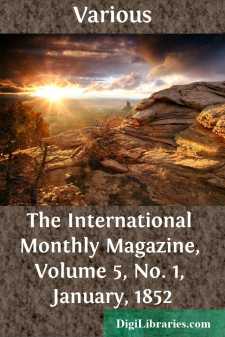Categories
- Antiques & Collectibles 13
- Architecture 36
- Art 48
- Bibles 22
- Biography & Autobiography 813
- Body, Mind & Spirit 142
- Business & Economics 28
- Children's Books 17
- Children's Fiction 14
- Computers 4
- Cooking 94
- Crafts & Hobbies 4
- Drama 346
- Education 46
- Family & Relationships 57
- Fiction 11829
- Games 19
- Gardening 17
- Health & Fitness 34
- History 1377
- House & Home 1
- Humor 147
- Juvenile Fiction 1873
- Juvenile Nonfiction 202
- Language Arts & Disciplines 88
- Law 16
- Literary Collections 686
- Literary Criticism 179
- Mathematics 13
- Medical 41
- Music 40
- Nature 179
- Non-Classifiable 1768
- Performing Arts 7
- Periodicals 1453
- Philosophy 64
- Photography 2
- Poetry 896
- Political Science 203
- Psychology 42
- Reference 154
- Religion 513
- Science 126
- Self-Help 84
- Social Science 81
- Sports & Recreation 34
- Study Aids 3
- Technology & Engineering 59
- Transportation 23
- Travel 463
- True Crime 29
The International Monthly Magazine, Volume 5, No. 1, January, 1852
by: Various
Categories:
Description:
Excerpt
KOSSUTH.
On the preceding page is the best portrait we have seen of the illustrious Hungarian, whose presence in America is destined to mark one of the brightest pages in the history of Liberty. Of his personal appearance we transcribe the description in the Tribune. He is taller than had generally been supposed, and his face has an expression of penetrating intellect which is not indicated in any portrait. It is long, the forehead broad, but not excessively high, though a slight baldness makes it seem so, and the chin narrow, but square in its form. His hair is thin in front and of a dark brown, as is his beard, which is quite long, but not very thick, and arranged with neatness and taste. His moustache is heavy and rather long. His eyes are very large, and of a light blue; his complexion is pale like that of a man who is not in perfect health, and his appearance yesterday was that of the spirit bearing up against the exhaustion of the body; he was sea-sick during the passage, and had not slept for two or three nights. His manner in speaking is at once incomparably dignified and graceful. Gestures more admirable and effective, and a play of countenance more expressive and magnetic, we remember in no other public speaker. He stands quite erect, and does not bend forward like some orators, to give emphasis to a sentence. His posture and appearance in repose are imposing, not only from their essential grace and dignity, but from a sense of power they impress upon the beholder. This sense of unused power, this certainty that he is not making an effort and doing his utmost, but that behind all this strength of fascination there are other treasures of strength, other stores of ability not brought into use, possibly never brought into use, is perhaps what constitutes the supreme charm of his oratory. He speaks as if with little preparation, and with that peculiar freshness which belongs to extemporaneous speaking; there is no effort about it, and the wonderful compactness and art of his argument are not felt until you reflect upon it afterward. His every movement is perfectly easy, and he gesticulates much, equally well with either arm. Nothing could be more beautiful in its way than the sweep of his right hand, as it was raised to Heaven, when he spoke of the Deity—nothing sweeter than the smile which at times mantles his face. His voice is not very loud, but it was heard distinctly through the large pavilion. On the whole our previous impression was perfectly confirmed by hearing him. In speaking, Kossuth occasionally referred to notes which lay on the stand before him. He was dressed after the Hungarian fashion, in a black velvet tunic, single breasted, with standing collar and transparent black buttons. He also wore an overcoat or sack of black velvet with broad fur and loose sleeves. He wore light kid gloves. Generally his English is fluent and distinct, with a marked foreign accent, though at times this is not at all apparent. He speaks rather slowly than otherwise, and occasionally hesitates for a word....












